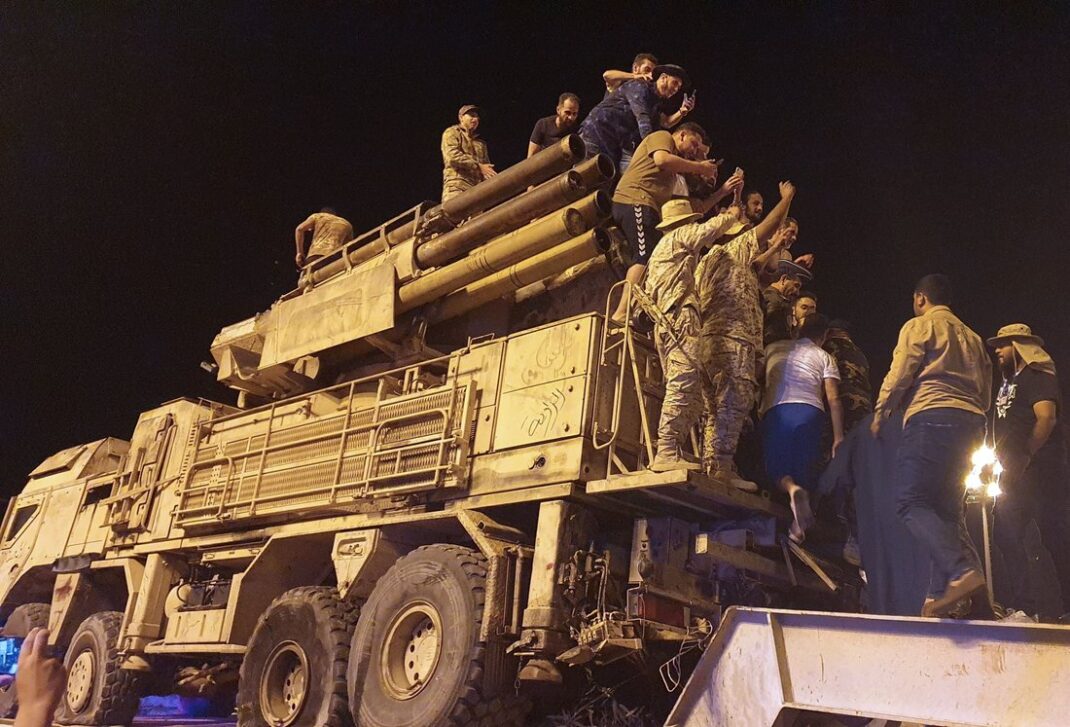By Şeyma Nazli Gürbüz
 Libya’s internationally recognized legitimate government’s fight against Haftar’s militia continues with new achievements every day; however, with the UAE’s constant backing of the putschist general, experts do not expect the conflict to end in the near future.
Libya’s internationally recognized legitimate government’s fight against Haftar’s militia continues with new achievements every day; however, with the UAE’s constant backing of the putschist general, experts do not expect the conflict to end in the near future.
.PART (I)
Libya has been witnessing a critical change in the course of events in its civil war recently as the United Nations-backed Libyan Army has been advancing, with the support of Turkey, by gradually taking one strategic point after another.
According to experts, however, despite the obvious shift in the power balance in the war-torn country, it is too soon to claim that the end of the conflict is near, with many expecting clashes to escalate even further in the upcoming days.
Last week, the Libyan civil war made headlines with breaking news of the critical Al-Watiya air base passing into the hands of forces loyal to the Government of National Accord (GNA), who liberated the base from the occupation of the putschist Gen. Khalifa Haftar’s militias.
The move came after the Libyan Army destroyed three other Russian-made Pantsir-type air defense systems used by Haftar’s forces that were supplied by the United Arab Emirates (UAE).
“This capture of Al-Watiya is highly symbolic for the GNA forces and is a clear sign of the GNA’s ascendancy relative to Haftar, especially given the month of military victories which led up to it,” said Tarek Megeresi, a political analyst and researcher who specializes in Libyan affairs, underlining the importance of the move.
Since the beginning of the civil war, in western Libya, there were two crucial supply centers belonging to Haftar forces, which are normally based in the eastern parts of the country, particularly in Benghazi.
Haftar militias were delivering the supplies coming from the east to these two centers in the west: Al-Watiya air base and the Tarhuna region. This means that these strategic points were the center of the Haftar operation in western Libya.
Emrah Kekilli, a researcher at the Foundation for Political, Economic and Social Research (SETA), pointed to the fact that the GNA’s fight against Haftar militias actually gained momentum after launching Operation Rage of Volcano in April.
“After the deal with Turkey, the GNA gained strength and launched an operation with an aim to remove these supply centers and prevent Haftar forces from attacking the capital Tripoli,” Kekilli said.
Libya and Turkey signed agreements in November outlining cooperation in terms of security and maritime affairs, angering Mediterranean countries, including Greece and the Greek Cypriot administration, which are prevented from unilaterally exploiting energy resources in the region by the diplomatic maneuver.
Following the deal, the Turkish Parliament in January passed a motion allowing for the deployment of troops to Libya for one year in order to respond to threats from illegitimate armed groups and other terror groups working against both countries’ national interests.
In Megeresi’s opinion, the loss of Al-Watiya will be a big blow to Haftar’s image and the morale of his troops.
“And, it is a significant moment in the GNA’s bid to corral all Haftar’s forces in western Libya into Tarhuna. Also, now the GNA will have significantly more forces available to direct toward removing Haftar’s forces from southern Tripoli.
This is the clearest signal yet that the game in Libya has changed,” he underlined.
Since the ousting of late dictator Moammar Gadhafi in 2011, two seats of power have emerged in Libya: Haftar in eastern Libya, supported by Egypt and the UAE, and the GNA in Tripoli, which enjoys U.N. and international recognition.
According to Ferhat Pirinççi, a professor of international relations at Uludağ University, the move marks the beginning of the end for Haftar.
“The capturing of Al-Watiya clearly changed the power balance in favor of the GNA. The idea that Haftar forces are losing in the field is being highlighted with this gain,” Pirinççi stated, adding that it also increases the security of Tripoli.
However, despite the consensus on the significance of the capture of the Al-Watiya air base, experts highlight that the war still continues and it is too early for the GNA to declare victory.
“It is a significant event against a backdrop of other – relative – successes in recent weeks. However significant and preponderant in many areas of the country, Haftar’s military power has been generally overestimated, but recent setbacks have made its limits all the more apparent.
Turkey’s involvement in the conflict has helped exposed this reality,” said Emiliano Alessandri, an expert on Euro-Mediterranean relations with a focus on North Africa.
Next target of GNA: Tarhuna
The initial next step is expected to be targetting the other supply point of Haftar forces in western Libya: the Tarhuna region.
“Now that Al-Watiya is captured, we can expect that the focus of the GNA’s operation will switch solely to Tarhuna, which has been already surrounded,” Kekilli said.
Tarhuna comes to the forefront as one of the gathering and supply points for Haftar forces. The province consists of 65 big families that have major influence over the country.
One of them is the Tarhuna family, sharing the same name with the province, which works with Haftar’s forces.
The family took Mitiga International Airport in Tripoli under control in 2017 and allowed Haftar forces to be deployed. The attacks in the province have escalated further since January 2020 and have cost the lives of hundreds of civilians.
“If Tarhuna falls as well, this means that the Haftar forces in the west will be completely besieged,” Kekilli emphasized.
These gradual advancements of the GNA and determined steps to completely secure Tripoli had an impact on Haftar militias and their supporters not only in terms of military losses but also regarding motivation.
Enes Canlı, a Libya reporter of Anadolu Agency (AA), highlighted the fact that although it was a major military achievement, the capturing of Al-Watiya also has a psychological aspect to it.
“Until recently, the GNA was constantly in a defensive position, even after the agreement with Turkey. It even lost the city of Sirte to Haftar forces in January,” he said.
“However, with the launch of Operation Volcano Rage, things started to change,” Canlı said. “Turkey’s armed UAVs (unmanned aerial vehicles) have a great responsibility for this change. By April 13, all the coastal provinces toward western Libya had been liberated from Haftar.”
Haftar militias’ morale damaged
At the beginning of May, Haftar engaged in an unexpected move by declaring a cease-fire for the duration of the holy month of Ramadan, a step interpreted by many as a signifier of his lack of motivation in the face of the GNA’s success.
Although neither of the sides has committed to the unilaterally declared cease-fire, particularly Haftar himself, as the GNA continued to advance, similar statements on a cease-fire have come from Haftar’s backers as well.
Last week, the UAE’s foreign minister, Anwar Gargash, said on Twitter that the only acceptable path forward involves an immediate, comprehensive cease-fire and return to the political process.
In Megeresi’s opinion, Haftar’s declaration of a cease-fire was a highly cynical act.
“(The cease-fire declaration was) an attempt to either, by himself, with time and space, consolidate his forces or in a worst-case scenario flip the script on the GNA for refusing a cease-fire – which is something Haftar usually does – and direct international attention their way,” he said, underlining that it was a direct result of the series of military victories the GNA have had over Haftar in recent weeks.
For Pirinççi, however, Haftar may have also acted upon completely different motives in declaring the cease-fire.
“It is true that Haftar’s resistance has been weakening every day that it fails to capture Tripoli.
This may be the cause of the declaration of the cease-fire. However, the move can also be interpreted as a failed attempt that has no practical value, but a step to only win the international community,” Pirinççi said.
***
Şeyma Nazli Gürbüz is politics editor at Daily Sabah- an English language Turkish newspaper.
____________





